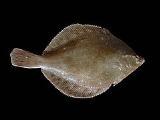
Pleuronectes
Encyclopedia
Pleuronectes is a genus of fish
in the Pleuronectidae
family.
Fish
Fish are a paraphyletic group of organisms that consist of all gill-bearing aquatic vertebrate animals that lack limbs with digits. Included in this definition are the living hagfish, lampreys, and cartilaginous and bony fish, as well as various extinct related groups...
in the Pleuronectidae
Pleuronectidae
Righteye flounders are a family, Pleuronectidae, of flounders. They are called "righteye flounders" because most species lie on the sea bottom on their left side, with both eyes on the right side. The Paralichthyidae are the opposite, with their eyes on the left side.Their dorsal and anal fins are...
family.
Species
- European plaiceEuropean plaiceThe European plaice, Pleuronectes platessa, is a commercially important flatfish.- Distribution and habitat :The geographical range of the European plaice is off all coasts from the Barents Sea to the Mediterranean, also in the Northeast Atlantic and along Greenland...
, Pleuronectes platessa (LinnaeusCarolus LinnaeusCarl Linnaeus , also known after his ennoblement as , was a Swedish botanist, physician, and zoologist, who laid the foundations for the modern scheme of binomial nomenclature. He is known as the father of modern taxonomy, and is also considered one of the fathers of modern ecology...
, 1758). - Alaska plaiceAlaska plaiceAlaska plaice is a saltwater fish that live in the North Pacific Ocean. Like most flatfish, they live on the bottom of the continental shelf, up to 600 metres deep. Their geographic range is from the Gulf of Alaska in the east, to the Chukchi Sea in the north, to the Sea of Japan in the west...
, Pleuronectes quadrituberculatus (PallasPeter Simon PallasPeter Simon Pallas was a German zoologist and botanist who worked in Russia.- Life and work :Pallas was born in Berlin, the son of Professor of Surgery Simon Pallas. He studied with private tutors and took an interest in natural history, later attending the University of Halle and the University...
, 1814).

